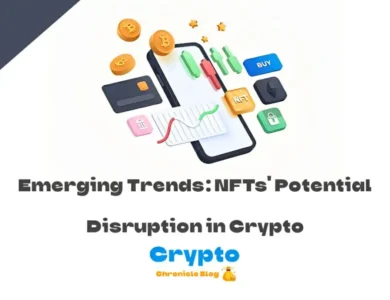Future of Blockchain Tech: Innovations Ahead
Blockchain technology has revolutionized the digital landscape, offering decentralized solutions to various industries. As we look to the future, technological innovations continue to shape the trajectory of blockchain and cryptocurrencies. In this comprehensive article, we explore the latest advancements in blockchain technology and the potential impact on the future of cryptocurrencies.
Introduction
Blockchain technology has evolved significantly since its inception, paving the way for new opportunities and challenges in the digital world. In this article, we delve into the technological innovations driving the future of blockchain and cryptocurrencies.
Understanding Blockchain Technology
Before delving into the future, it’s essential to understand the fundamentals of blockchain technology. We explore the concept of blockchain, its decentralized nature, and its role in securing transactions across distributed networks.
Evolution of Blockchain Technology
The evolution of blockchain technology has been remarkable, with advancements in scalability, interoperability, and security. We examine how new consensus mechanisms, such as proof-of-stake and sharding, are addressing scalability challenges and improving network efficiency.
DeFi and Smart Contracts
Decentralized finance (DeFi) and smart contracts are revolutionizing traditional financial systems. We explore the role of smart contracts in automating transactions and facilitating complex financial instruments, such as decentralized lending and borrowing.
Interoperability and Cross-Chain Solutions
Interoperability is crucial for the mass adoption of blockchain technology. We discuss the importance of cross-chain solutions and interoperability protocols in bridging different blockchain networks and enabling seamless asset transfer.
Privacy and Security Enhancements
Privacy and security are paramount in the blockchain space. We examine the latest advancements in privacy-preserving technologies, such as zero-knowledge proofs and ring signatures, to enhance confidentiality and data integrity.
Tokenization and Digital Assets
The tokenization of assets is transforming traditional markets, enabling fractional ownership and enhancing liquidity. We explore the rise of tokenized assets and their potential to unlock new investment opportunities and democratize access to financial markets.
Impact on Industries
Blockchain technology has the potential to disrupt various industries, including finance, healthcare, supply chain, and gaming. We analyze how blockchain solutions are reshaping these industries and driving innovation across sectors.
Challenges and Regulatory Considerations
Despite its potential, blockchain technology faces challenges, including regulatory uncertainty and scalability limitations. We discuss the regulatory landscape surrounding cryptocurrencies and the need for clear guidelines to foster innovation and adoption.
Future Outlook
As we look to the future, the potential of blockchain technology is limitless. We envision a future where blockchain-powered solutions drive efficiency, transparency, and inclusivity across industries, paving the way for a decentralized digital economy.
Conclusion
In conclusion, technological innovations continue to propel the future of blockchain and cryptocurrencies forward. With ongoing research and development, blockchain technology is poised to revolutionize various aspects of our lives, shaping a more decentralized and interconnected world.
FAQs
1. What are the key technological innovations driving the future of blockchain?
The key technological innovations driving the future of blockchain include:
- Scalability Solutions: Advancements in consensus mechanisms and network architectures aim to address scalability issues, enabling blockchain networks to handle a higher throughput of transactions.
- Interoperability Protocols: Interoperability solutions facilitate seamless communication and asset transfer between different blockchain networks, promoting interoperability and enhancing the overall usability of blockchain technology.
- Privacy-Preserving Technologies: Innovations such as zero-knowledge proofs and homomorphic encryption enhance privacy on blockchain networks, allowing users to transact securely while maintaining confidentiality.
- Smart Contract Enhancements: Continuous improvements in smart contract languages and development frameworks enable more complex and secure smart contract functionalities, expanding the potential applications of blockchain technology.
- Decentralized Finance (DeFi) Innovations: DeFi protocols and decentralized applications (dApps) are driving innovation in financial services, offering decentralized lending, borrowing, trading, and asset management solutions built on blockchain technology.
- Tokenization of Assets: The tokenization of real-world assets represents a significant innovation, allowing for the fractional ownership and trading of traditional assets such as real estate, art, and commodities on blockchain networks.
- Consensus Algorithm Research: Research into novel consensus algorithms, such as proof-of-stake (PoS) variants and hybrid consensus mechanisms, aims to improve network security, energy efficiency, and governance in blockchain networks.
- Cross-Chain Solutions: Cross-chain interoperability protocols and atomic swap technologies enable seamless asset transfer between different blockchain networks, fostering a more interconnected and efficient ecosystem.
These technological innovations collectively drive the evolution of blockchain technology, paving the way for greater scalability, interoperability, privacy, and innovation in the future.
2. How are smart contracts revolutionizing decentralized finance (DeFi)?
Smart contracts are revolutionizing decentralized finance (DeFi) by introducing programmable and automated financial agreements that operate without the need for intermediaries. Here’s how they’re making a significant impact:
- Automated Transactions: Smart contracts enable the automatic execution of financial transactions once predefined conditions are met. This automation streamlines processes such as lending, borrowing, and trading, reducing the need for manual intervention and associated costs.
- Decentralized Lending and Borrowing: Smart contracts power decentralized lending and borrowing platforms, allowing users to borrow assets or earn interest by lending out their assets directly to other users. This eliminates the need for traditional financial intermediaries like banks, enabling peer-to-peer lending on a global scale.
- Immutable and Transparent Agreements: Smart contracts are immutable once deployed on the blockchain, meaning they cannot be altered or tampered with. This ensures the integrity of financial agreements and provides transparency to all parties involved, reducing the risk of fraud and disputes.
- Collateralized Loans: Smart contracts facilitate collateralized loans, where borrowers pledge digital assets as collateral to secure loans. In the event of default, the collateral can be automatically liquidated by the smart contract, reducing the risk for lenders and enabling trustless lending.
- Automated Asset Management: DeFi protocols leverage smart contracts to automate asset management strategies such as yield farming, liquidity provision, and asset rebalancing. This allows users to earn passive income on their crypto assets without relying on centralized intermediaries.
- Decentralized Exchanges (DEXs): Smart contracts power decentralized exchanges, enabling users to trade digital assets directly with each other without the need for a centralized exchange operator. This enhances liquidity, reduces trading fees, and mitigates counterparty risk.
- Innovative Financial Products: Smart contracts enable the creation of innovative financial products such as synthetic assets, options, and derivatives on decentralized platforms. These products provide users with access to a wide range of investment opportunities previously unavailable in traditional finance.
Overall, smart contracts play a pivotal role in democratizing access to financial services, improving efficiency, and fostering innovation in the DeFi space. They empower individuals to take control of their finances, participate in global markets, and unlock new economic opportunities in a decentralized and permissionless manner.



